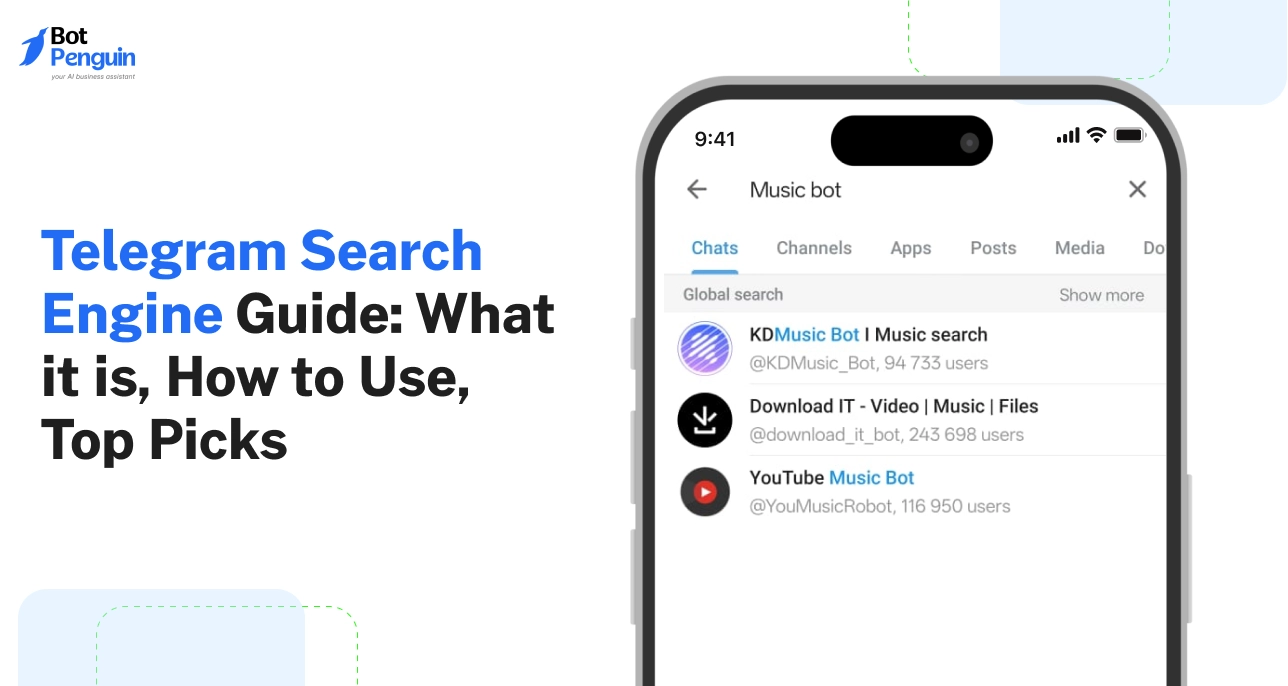Introduction
Over 700 million people use Telegram. Yet most struggle to find what they need.
Channels stay buried. Groups remain hidden. Bots feel impossible to discover. Telegram’s own search often misses the mark.
That’s why Telegram search engines exist. They make discovery faster and easier. You can type a keyword and instantly see channels, groups, bots, or files.
This guide explains what a Telegram search engine is, how it works, and why it matters. You’ll also see the best options available today.
What is a Telegram Search Engine?
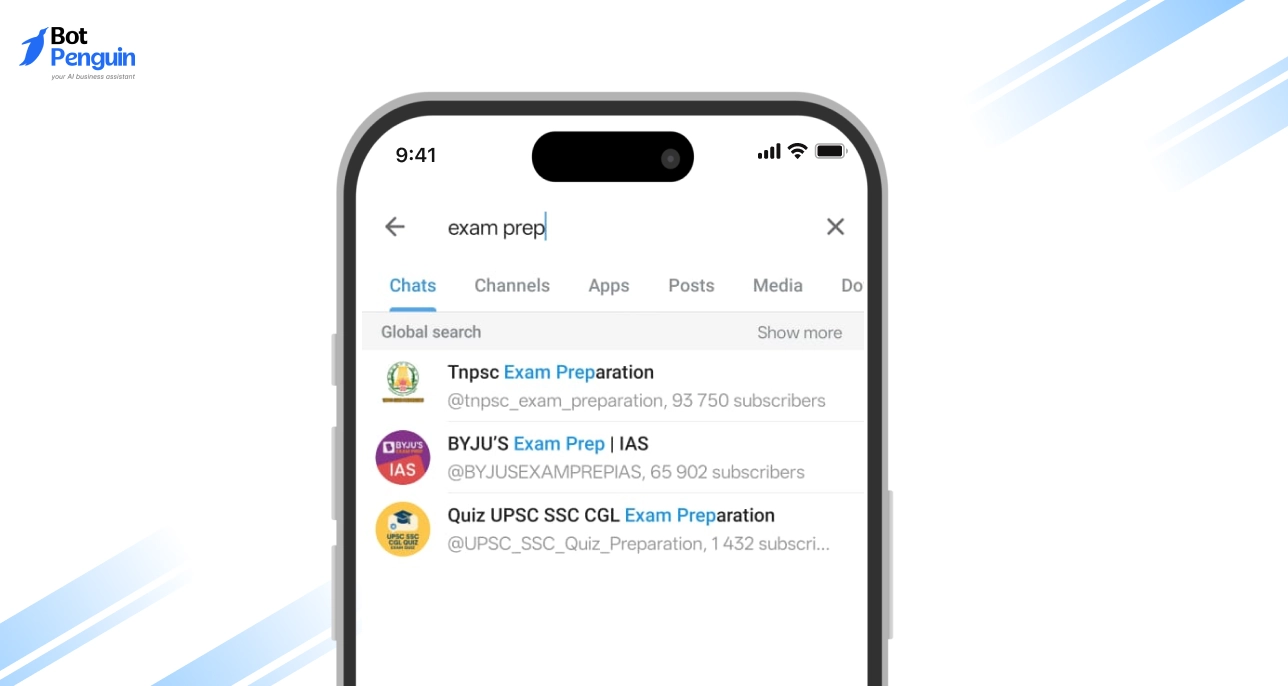
A Telegram search engine is a tool—usually a website or web app—that helps you find public Telegram channels, groups, bots, and files.
Telegram itself has a search bar, but it’s limited. It often misses active or relevant spaces. That’s why external search engines exist. They scan and index public Telegram content, then organize it into searchable lists.
Type in “finance,” “exam prep,” or “movie updates,” and you’ll see active results instantly. Some engines also display channel size, engagement, or growth data. This helps you avoid dead or inactive groups.
In short, a Telegram search engine makes the platform more searchable, structured, and user-friendly than Telegram’s built-in search.
How Telegram Search Engines Work
A search engine for Telegram works like Google on a smaller scale. It crawls public channels, groups, and bots, collecting names, keywords, and descriptions.
When you type a query, it matches your keyword against this index. The results show active channels or groups that fit.
Some tools provide filters. You can sort results by category, language, region, or popularity. Others highlight engagement metrics to show which spaces are most active.
This makes results more reliable and saves time compared to Telegram’s built-in search, which lacks both precision and filtering.
Telegram Search Engine vs Telegram Search Bot
It’s easy to confuse an external tool with a Telegram bot search engine. But they serve different purposes.
A Telegram search bot runs inside the app. You interact with it in chat, and it returns quick results. But its scope is limited.
External search engines are websites. They index global Telegram content across channels, groups, and bots. Their coverage is wider and better suited for discovery.
Here’s a quick comparison:
Both have their place. But if you want the biggest reach, engines are the better choice. Bots are useful for quick, targeted searches.
A Telegram search engine makes Telegram’s massive world easier to explore. It connects people to groups, channels, and bots that matter.
Now, let’s dive into why using one can actually change your Telegram experience.
Why Use a Telegram Search Engine?
Knowing what a Telegram search engine only solves half the puzzle. The real question is whether it’s worth using.
Telegram is constantly expanding, with new groups, channels, and bots appearing every day. These tools can open doors to communities, content, and insights you might otherwise miss. But like any tool, they come with both strengths and drawbacks.
Let’s break down the benefits first, then look at the limitations.
Benefits of Using Telegram Search Engines
The main benefit is discovery.
A Telegram group search engine can help you find study groups for exams, trading hubs for financial updates, or hobby communities like photography.
Beyond discovery, engines offer practical benefits:
- Faster results – Skip irrelevant searches and join active spaces quickly.
- Analytics – Many engines show subscriber growth or engagement rates, helping you avoid inactive groups.
- Content access – A Telegram message search engine lets you search old posts, shared PDFs, or videos without joining multiple groups.
These benefits make search engines a smarter way to navigate Telegram. They don’t just save time but also add confidence in choosing the right communities.
Limitations of Telegram Search Engines
Despite their strengths, engines aren’t perfect. Here’s what to keep in mind:
- Public only – Private or invite-only channels are never indexed.
- Update delays – Some engines refresh daily, but others may lag, leading to outdated results.
- Privacy concerns – Not every search engine is transparent about how it handles user data.
Other limitations exist too.
Some engines provide only basic listings without showing engagement or growth insights, which reduces their usefulness. In other cases, niche topics may return very few or no results at all, leaving gaps in discovery.
These drawbacks don’t erase their value. Engines remain essential for making sense of Telegram’s massive ecosystem.
Next, let’s look at the types of search engine for Telegram and how each one focuses on a specific need.
Types of Telegram Search Engines
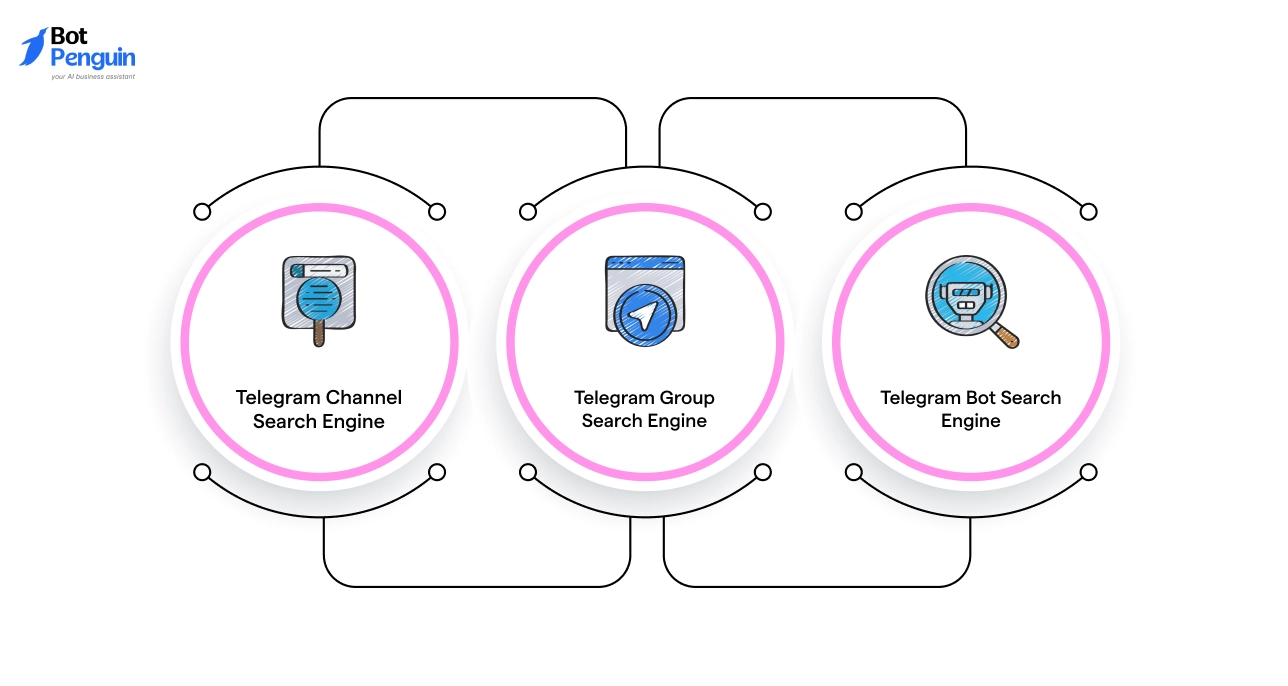
We’ve seen why a Telegram search engine is useful. But not all of them work the same way.
Each one is built for a specific purpose. Some focus on channels, others on groups, and a few on bots. Understanding the differences helps you choose the right tool instead of relying on guesswork.
Telegram Channel Search Engine
A search engine for Telegram channel helps you find broadcast-style spaces. Think of news updates, crypto signals, or entertainment feeds.
Instead of browsing Telegram blindly, you can type keywords like “global news” or “movie updates” and instantly see channels posting regular content.
Many of these engines organize results by language, region, or topic. That makes it easier to find reliable channels instead of inactive ones.
If you mainly follow creators or businesses, a channel-focused engine saves time and keeps your feed relevant.
Telegram Group Search Engine
Groups are different from channels. They’re about interaction and discussion.
A Telegram group search engine makes it easier to find these active communities.
Picture a student preparing for exams and searching for study circles. Or a trader looking for daily market discussions. Instead of trial and error, the engine gives direct links to live groups.
Many engines also show group size or engagement levels. That way, you can avoid empty spaces and join places where conversations actually happen.
If community interaction matters to you, group-based engines are the right pick.
Telegram Bot Search Engine
Bots add utility to Telegram. They can automate tasks, fetch data, or even provide entertainment. A bot search engine makes discovering them easier.
Need a bot that converts files, tracks expenses, or answers questions with AI? Searching inside Telegram can be hit-or-miss. With a bot-focused engine, you get a curated list of working options.
These engines often categorize bots by function—productivity, finance, or tools. That saves time and ensures you don’t waste effort on bots that don’t work.
For users seeking utility beyond chats, bot engines are invaluable.
Telegram search engines aren’t one-size-fits-all.
Some deliver news feeds, others build communities, and a few unlock tools. Knowing the difference helps you choose wisely.
Now, let’s move from categories to practice.
How to Use a Telegram Search Engine
A search engine for Telegram is simple in practice but powerful when used well. The difference comes from how you refine your search.
Some engines let you filter by topic, language, or even popularity. Others highlight analytics so you know which spaces are active.
With the right steps, you can find channels, groups, or bots without wasting time.
How to Find Telegram Groups with a Search Engine?

A Telegram group search engine is designed to connect you with active communities.
Start by typing a topic like “exam prep,” “crypto trading,” or “fitness.”
Results often come with group sizes and activity levels. Look for groups with regular discussions, not just a large member count. For example, a 5,000-member group with daily chats is more useful than a silent one with 50,000 members.
Most engines also provide join links directly. Once you find a match, you can join with one click. This saves the hassle of endless scrolling inside Telegram.
By searching smartly, you’ll find communities where people actively share, debate, and collaborate.
How to Find Telegram Channels with a Search Engine?
A Telegram channel search engine works best for broadcast-style content.
You can search by interest—like “tech news,” “stock updates,” or “movie releases.”
Many engines allow filters for region and language. That means you can find local news channels or global ones, depending on your need. Some engines also show analytics, like subscriber growth, so you can spot reliable channels instead of inactive ones.
For example, a fast-growing finance channel may be more relevant than one that hasn’t posted in months.
Using these insights helps you follow channels that consistently deliver value.
Using a search engine isn’t just about typing keywords. It’s about knowing how to filter results and read the signals of quality.
Now that you know the process, let’s explore the top search engines and see which ones deliver the strongest results.
5 Best Telegram Search Engines in 2025
You now know how to use these tools effectively. But the real question is—which ones are worth your time? Not all engines deliver the same accuracy or features.
Some focus on analytics, others on speed or simplicity.
To save you the trial and error, here’s a list of the best Telegram search engines, each standing out for a specific strength.
1. TGStat – Analytics Rich
TGStat is one of the most popular and powerful Telegram search engines, indexing tens of billions of posts across public groups and channels.
Its coverage makes it an essential tool for anyone who wants more than just discovery.
Unlike a basic directory, TGStat provides detailed analytics. Users can view subscriber growth, engagement rates, and post reach, making it particularly useful for marketers, analysts, and researchers.
For instance, a business looking for influencers can compare audience activity between channels before deciding where to collaborate.
The platform also supports country and language-specific searches, allowing users to find channels tailored to their region.
Most features are available for free, with premium plans offering deeper insights and historical reports. Its interface is clean and designed for efficient comparisons.
Unique Strengths:
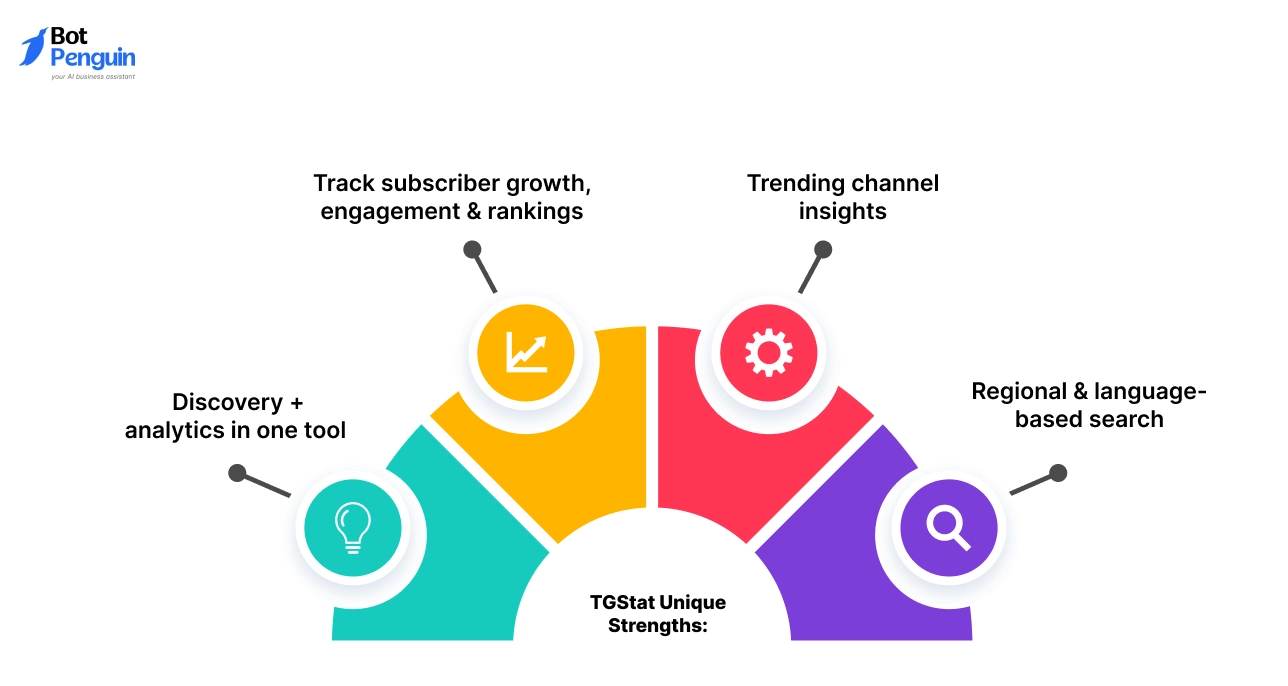
- Combines discovery with analytics in one tool.
- Tracks subscriber growth, engagement, and rankings.
- Provides trending channel insights.
- Offers regional and language-based search.
2. Telegago – Fast and Reliable
Telegago is a lightweight Telegram search engine designed for speed and precision.
Its interface resembles Google, making it easy for anyone to start searching without a learning curve. Unlike Telegram’s built-in search, Telegago focuses on fast keyword results across both public groups and channels.
The platform supports search operators, allowing users to refine queries for more specific results.
For example, if you know the exact topic—like “crypto news” or “movie updates”—you can get accurate matches instantly without wading through unrelated spaces.
This makes it especially useful for students, hobbyists, or professionals who already know the subject they want to explore.
Telegago is free to use and requires no sign-up. Its minimal design keeps the process simple, giving you direct access to communities without distractions.
Unique Strengths:
- Google-style interface with advanced operators.
- Delivers fast, accurate keyword-based searches.
- Works equally well for channels and groups.
- Lightweight and completely free to use.
3. Lyzem – Powerful Indexing
Lyzem is a Telegram search engine known for its wide indexing capabilities.
Unlike most tools, it not only scans Telegram channels and groups but also includes content from Telegraph, Telegram’s publishing platform.
This broader coverage makes it particularly valuable for those who want more than just surface-level results.
The platform constantly updates its search index, ensuring fresh content is always available.
Lyzem is especially effective at surfacing hidden or niche communities that rarely appear in Telegram’s built-in search.
For example, a researcher looking for rare academic groups or a hobbyist searching for small but active communities can rely on Lyzem to bring those results forward.
It’s completely free to use and requires no registration, keeping the process simple and accessible for everyone.
Unique Strengths:
- Indexes both Telegram and Telegraph content.
- Regularly updated for fresh results.
- Great for finding niche or hard-to-discover groups.
- Free access with no sign-up required.
4. TgramSearch – Large Catalog
TgramSearch is a Telegram search engine that focuses on scale and organization. With a catalog of over 700,000 channels and groups, it stands out as one of the largest public directories available today.
Instead of relying only on keyword search, users can browse by structured categories, languages, or regions. This makes TgramSearch especially useful for people who prefer browsing lists rather than typing specific queries.
For example, a casual user might explore entertainment groups in their language, while a researcher could filter by topic to identify communities across regions.
The catalog approach also helps users spot communities they may not have thought to search for directly.
The platform’s interface is clean and simple, making it easy for beginners to navigate. It’s free to use, and the filtering options help narrow results to match user interests.
Unique Strengths:
- Massive catalog of 700,000+ entries.
- Organized by language, topic, and region.
- Ideal for browsing without specific keywords.
- Simple and beginner-friendly interface.
5. TG.World – Easy Discovery
TG.World is a Telegram search engine built for straightforward discovery.
Its catalog is regularly updated with new channels, ensuring that results don’t go stale. Unlike tools that overwhelm with complex filters, TG.World keeps things simple with a clean, user-friendly interface that works well for beginners and casual users.
The platform categorizes channels into themes like entertainment, education, business, and tech. This makes browsing easier for users who want to explore by interest rather than specific keywords.
Each listing includes a direct join link, so users can connect with a channel instantly without additional steps.
TG.World is completely free and requires no login, keeping the experience fast and accessible.
It’s best for users who want easy browsing and immediate access to active Telegram spaces.
Unique Strengths:
- Regularly updated catalog of public channels.
- Organized by popular themes for easy browsing.
- Provides instant join links from search results.
- Free to use, no login required.
Specialized Telegram Search Engines
Broad tools like TGStat or Telegago work well for general discovery. But sometimes you need more precise results. This is where specialized engines help.
Below, we will discuss these specialized types and how each can be useful in different situations.
Telegram Message Search Engine
These type of search engine is built to scan channel archives and retrieve older posts quickly.
It’s especially useful for educational and research purposes, where past discussions or guides still hold value.
For example, a student might use it to recover a tutorial series shared months ago in a busy learning channel. A journalist could trace back older posts in news channels to analyze timelines or narratives.
One good example is Lyzem Messages, which indexes public posts and makes them keyword searchable.
Tools like this reduce time wasted scrolling and make Telegram a more reliable knowledge source.
Telegram File Search Engine
A file search engine focuses on documents and media shared in public channels. It caters to users looking for resources rather than conversations.
Think of a student searching for exam notes, a professional looking for reports, or a creator needing design templates. Instead of joining multiple groups and manually browsing, these engines point straight to the files.
File Search Bot is a popular choice. It indexes shared PDFs, videos, and even audio files, making them retrievable with simple keywords.
For anyone focused on resources, file engines are indispensable.
Telegram Group Link Search Engine
These search engines curate public invite links into easy-to-browse lists. It’s perfect for people who want instant entry into discussions without experimenting with random searches.
For example, someone interested in photography or crypto communities can find active groups in seconds. Engines like TGLink Search provide thousands of links organized by category, making community access direct and hassle-free.
This type of engine may look simple, but it eliminates the most common barrier on Telegram—finding active, open groups fast.
Specialized engines focus on precision.
Some help recover messages, others locate files, and a few provide direct links. They fill important gaps that broader tools leave behind, but using them wisely matters just as much as choosing the right one.
Knowing how to search is only part of the equation—staying safe while doing it is the other.
Tips for Using Telegram Search Engines Safely
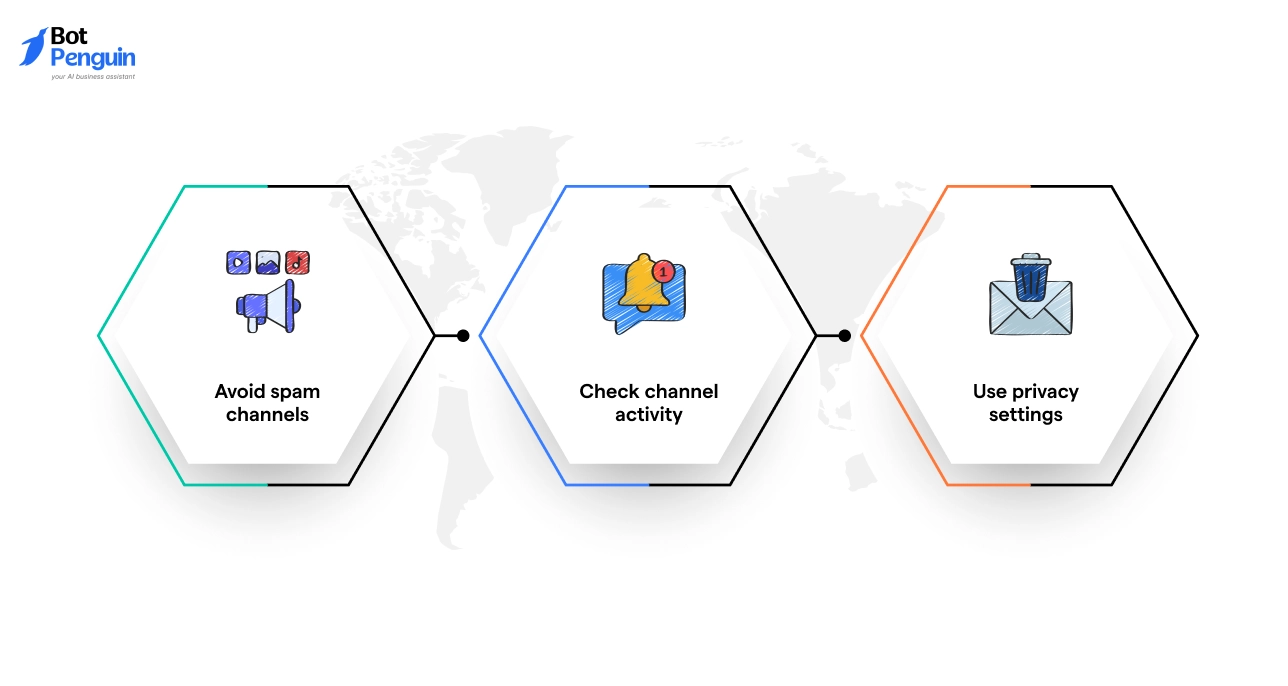
Specialized engines are helpful, but safety should always come first.
Not every result shown by a Telegram search engine is trustworthy. Some channels spread spam, others are inactive, and a few may misuse your data. Staying cautious ensures that discovery adds value rather than risk.
Below are simple but effective practices to explore Telegram communities safely while still getting the most out of these tools.
- Avoid spam channels – Fake groups often use clickbait names. For example, a “free giveaways” channel may only flood your feed with ads. Always check the content before joining.
- Check channel activity – A group with 50,000 members but no posts for weeks is less valuable than a smaller but active community.
- Use privacy settings – Hide your phone number, control who can add you to groups, and avoid sharing personal details publicly.
Safe searching keeps discovery productive. But, as search engines evolve, it’s equally important to understand where they might be heading next.
Future of Telegram Search Engines
As Telegram continues to grow, search tools will also evolve.
A Telegram search engine will no longer be limited to showing static lists of results. Instead, it will become smarter, adapting to the needs of users in real time.
Artificial intelligence is likely to play a major role. Search engines could begin offering personalized recommendations, suggesting groups or channels based on what you already follow.
Regional and interest-based filters will also become more precise, helping users discover local communities or professional spaces that match their context.
Even Telegram itself may improve its built-in search. If that happens, the line between official features and third-party engines could start to blur.
The future of discovery looks sharper and more tailored.
With these changes ahead, it’s time to reflect on the role search engines already play in shaping the Telegram experience.
Conclusion
Telegram is massive, but finding value inside it doesn’t have to be overwhelming.
Throughout this guide, we explored what a Telegram search engine is, why it matters, and the many forms it can take—from engines built for channels and groups to specialized tools for files, messages, and links.
We also looked at tips to stay safe and how these platforms may evolve in the future.
Each engine serves a unique purpose. The right one saves time, avoids clutter, and connects you to active communities.
Start exploring the engines mentioned and make your Telegram experience smarter, faster, and safer!
Frequently Asked Questions (FAQs)
Do Telegram search engines work on mobile browsers as well as desktops?
Yes. Most Telegram search engines like TGStat or Telegago are web-based and mobile-friendly. You can use them directly from your phone’s browser without extra apps.
The experience may vary by screen size, but the functionality remains the same across devices.
Can Telegram search engines be used without a Telegram account?
Yes, you can browse results without logging into Telegram. But to join a channel or group, you’ll need an active account.
Search engines act as directories; they don’t replace Telegram itself. Think of them as maps pointing to places you still need an entry pass for.
Are these search engines free, or do I need to pay?
Most Telegram search engines are free to use. Some, like TGStat, offer premium tiers for advanced analytics and historical reports.
For casual users, free versions are usually enough. Professionals, researchers, and marketers benefit more from paid features that offer deeper insights.
Do Telegram search engines also show deleted content?
No. Once a channel owner deletes a post or resource, it disappears from Telegram and can’t be retrieved by external tools.
Some engines may still show cached previews for a short time, but these eventually vanish as the index refreshes.
Can I build my own Telegram search engine?
Yes, though it requires technical effort. Developers can use Telegram’s API to collect public data and create custom indexes.
Some organizations build private engines to track industries or monitor communities. It’s doable, but scaling such a project requires server resources and maintenance.
